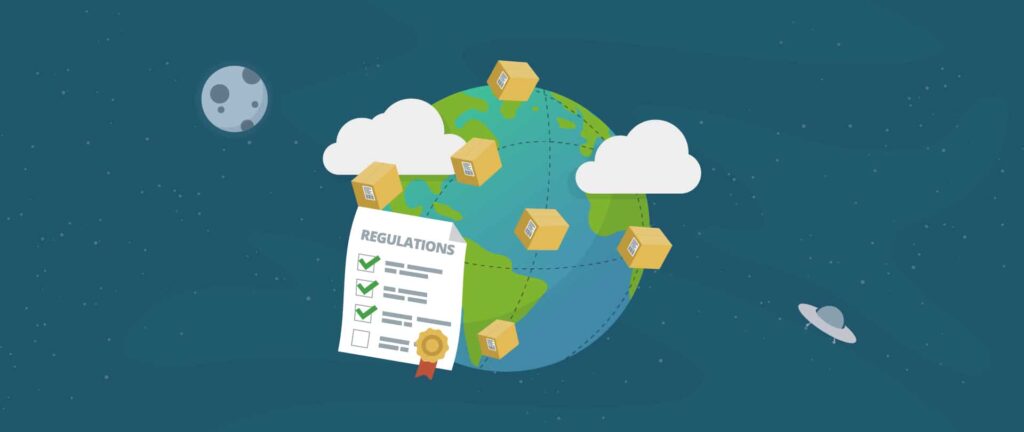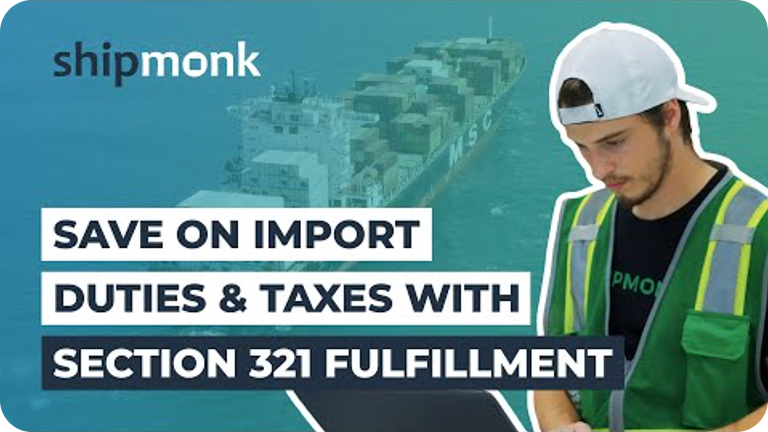International shipping… how hard can it really be? Spoiler alert: Pretty hard. The truth is that there are a million and one things to consider, and, even with outside help (say, outsourcing fulfillment to a 3PL), it’s still essential to be familiar with the terminology and expectations of international shipping.
In this article, we’ll be giving you a bird’s eye view of the different shipping regulations of some of the most popular countries to ship to, as well as what to watch out for. Read on to become the global eCommerce pro you were always meant to be!
Cost Overview
| Calculation Method | VAT/GST | De Minimis Duty | De Minimis Tax | |
|---|---|---|---|---|
| Canada | CIF | 5% | 20 CAD | 20 CAD |
| Mexico | CIF | 16% | 50 USD | 50 USD |
| UK | CIF | 20% | 135 GBP | 15 GBP |
| France | CIF | 20% | 150 EUR | 22 EUR |
| Germany | CIF | 19% | 22 EUR | 22 EUR |
| Switzerland | CIF | 7.7% | 0 USD | 0 USD |
| Japan | CIF | 10% | 10,000 JPY | 10,000 JPY |
| Singapore | CIF | 7% | 400 SGD | 400 SGD |
| Australia | FOB | 10% | 1,000 AUD | 0 AUD |
| New Zealand | CIF | 15% | 1,000 NZD | 0 NZD |
Already scratching your head? Don’t worry. Let’s break down what the terms above mean before we get any further.
De minimis
Although it sounds suspiciously like “mimosa,” the de minimis value is not quite as delicious. Instead, it’s simply the threshold in which you will not be charged for taxes. For example, if a country’s de minimis value is $20, packages valued $20 and below are not subject to taxes. There’s a de minimis value for duty and tax, which may be the same or differ, so be sure to keep an eye out for that.
CIF & FOB
CIF (Cost, Insurance, and Freight) and FOB (Free on Board) are international shipping agreements as well as two different ways to calculate taxes.
When using CIF, the VAT is applied to the sum of the item plus the cost of shipping.
With FOB, the VAT is just applied to the price of the item, sans shipping.
Let’s walk through two examples so you can pick up what we’re putting down.
- Brent is shipping a book to Australia. The book costs 25 AUD, which means that it’s exempt from de minimis tax, but not de minimis duty. Australia uses FOB, which means the tax will only be applied to the price of the product, 25 AUD, which gives us 2.5 AUD in import tax.
- Karen needs to ship a necklace to New Zealand. New Zealand uses CIF, which means we have to take shipping into account. The necklace is 50 NZD plus shipping, 10 NZD, meaning the tax (no duties, as the product falls below the 1,000 NZD threshold) will be calculated from the $60. The rate is 15% which equals 9 NZD.
Not so complicated, right? Once you get the hang of it, it will be easy to have at least some idea of the total cost of your international shipment. However, there is quite a bit more to look out for.
Other Considerations
If there’s one thing you should know about international shipping, it’s that the taxes never end. There are taxes and fines for pretty much everything, including the category of the product you’re shipping. You see, not all categories are judged the same. For example, Canada adds an additional tax to luggage — 11%.
Problems could also arise if your order volume is especially high in a certain country. Customs can interpret multiple smaller packages being sent in rapid succession as an attempt to evade taxation on extremely large orders — think Walmart-sized inventory shipments being sent overseas. If you’re not sure what that spells, it’s big trouble for you and your business! Ensuring your shipment is properly accounted for every step of the way may sound tedious, but it’s absolutely essential unless you’re into raising international eyebrows at customs!
Prohibitions & Restrictions
If we sat here talking about every country’s prohibitions and restrictions, we would be here all day. And by that, we mean you would be here all day, scrolling through endless pages of information you might never even use… and we don’t want that!
The thing about shipping prohibitions and restrictions is that they vary by country and by carrier. So, aside from the obvious things like poison and illegal substances (which no country wants to receive), there are unique factors which will be difficult to account for unless research is done beforehand.
So, since nothing can be done about shipping prohibited items, how would your business get around to shipping restricted products? Paperwork and special provisions (like changing the packaging) at the very basic level, but some scenarios would also require you to have a well-established contract with your chosen carrier before shipping. “It depends” may very well be everyone’s least favorite answer, but it (unfortunately!) couldn’t be more accurate when it comes to international shipping.
In addition to specific items, be on the lookout for size restrictions as well. Your shipping carrier will have plenty of information about this, so be sure to double check with them to save you multiple trips to the post office, some dolla dolla bills, and at least a few headaches!
Essential Documentation
If you’re partnering with a 3PL (wink wink!), you won’t need to worry about documentation that much, but there are still two invoices you should be familiar with: commercial and proforma. A commercial invoice serves as a declaration of what is being sent and the amounts due, while a proforma invoice is sent prior to the shipment and essentially acts as a receipt for the buyer.
Of course, that could change as well. While the commercial and proforma invoices are pretty much a given, different countries have different requirements for what they’re looking for.
Now take a deep breath and congratulate yourself for finishing this article! This isn’t our first rodeo by any means, but we can still recognize the inherent complexity of international shipping. What we don’t want is to scare you off from pushing your business to take its next big leap. International eCommerce is growing every year, and it’s in your business’s best interest to take advantage of that.
Need a little help? No problem! Just shoot us a line and we’ll get to the bottom of this international shipping thing once and for all.
Disclaimer: As always, we recommend consulting a tax professional for personalized advice before shipping internationally.





